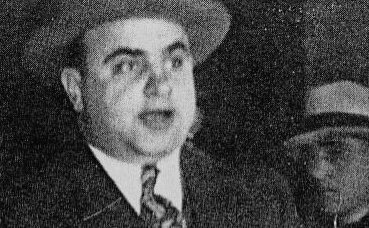Capone himself produced
witnesses to
show that he got revenue in these years. His defense witnesses said he
lost
large sums in race bets in four of those years. These losses totaled
$217,000....
We find him
living in Florida
like a bejeweled
prince in a palatial home. We find that he spent thousands of dollars
without
even thinking twice. We find him receiving thousands of dollars in
telegraphic
money orders from Chicago.
Let's find out how Capone got all this money. He told Florida
authorities, trying to get him out
of the state, that he was a gambler, a realtor, a cleaner and presser
and a dog
race-track owner. He told questioners in Florida
that Jake Guzik was his financial secretary. On his income of
'secretary,'
Guzik has been convicted of income tax fraud. What about the income of
his
boss, Capone?....
Where did
Capone get this money? At the start we find a man
living on a fine estate in Florida,
spending money like a baron and with the lavishness of an Indian prince.
We have
heard of jewels, and fine furnishings--everything bought with cash.
The Florida
people were interested in where all this money came from, and they
asked
Capone. He told them. He said he was a gambler in Cicero and Chicago
and was in
the real estate and cleaning and dyeing business and added that
he had an interest in the dog tracks.
We see,
furthermore, by going to his office in the Metropole or Lexington hotels
that he
was surrounded by an organization of men who use assumed names. When
they moved into the Lexington Hotel these men wouldn't even
use their
own names. They pushed the register aside. Most of
that organization appeared on the witness stand. You saw men that
testified
that when Capone called them and said "Come to my office," they went.
He pulled a string and they came running. These witnesses could
remember
nothing save that Capone lost money.
The Florida
people who came here to testify before you included some who fronted
for
Capone. There was Parker Henderson, who cashed Capone's checks for him
and
tried to disguise his handwriting when he did so....
There
can't be the slightest doubt that this man had a fabulous
income, and that he did not want to pay a tax or deal with the
government.
Finally he was cornered and came in with a special tax man and tried to
settle
up. Gentlemen, you have the privilege to put the stamp of disapproval
on the
conduct registered in this case. |
